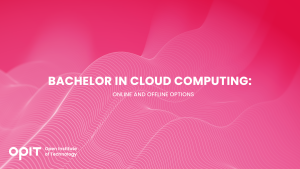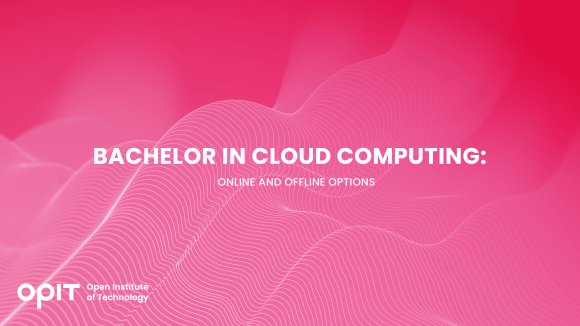

Cloud computing has quickly become one of the fastest-growing industries. The U.S. Bureau of Labor Statistics estimates that the demand for roles in the industry will grow much faster than the average for all occupations. This means that students today will likely be able to find a career in cloud computing much faster than usual. To further illustrate the point, Indeed currently lists more than 8,000 job openings for cloud computing roles.
Despite that, many companies are seeking only top talent, which quickly reduces the available options and drives up demands (as well as salaries). If you want to get a lucrative job in the industry, you must have the appropriate skillset to match.
However, a general background in IT may no longer be enough. A dedicated cloud computing bachelor degree will provide you with the exact abilities you need to excel in these roles and will allow you to upskill to senior positions quickly.
Why Choose a Bachelor in Cloud Computing?
One of the most common misconceptions about programming jobs—and, by extension, cloud computing—is that you don’t need a degree to land a job.
While you can technically get a job in IT without a degree and go from there, the path to success through independent learning is often rocky. You may need to spend multiple years honing your skills through non-accredited courses and self-learning videos. Even if you do manage to get a role close to cloud computing, you may have a more difficult time acclimating to specific job requirements, and your progression may be limited without a degree.
On the other hand, a bachelor’s degree in IT or computer science provides an excellent foundational background. While you might not use all the theoretical knowledge you learn, finishing a bachelor’s degree gives you a broad range of expertise you can leverage to zero in on a desired career path. Specifically, for a bachelor in cloud computing, the focus is on learning different programming languages and coding practices to allow you to adapt to any platform you may need to use during your future job.
Furthermore, completing a bachelor’s shows that you have persistence and can apply theory to practice in exams and project work as part of your degree.
Additionally, many institutions that offer a bachelor’s degree in cloud computing also have close connections with nearby companies that require these positions to grow. They can provide internships to promising students even before they finish their studies and keep them on as permanent team members afterward.
Understanding the Curriculum of a Cloud Computing Bachelor Degree
Cloud computing is an extensive term that encompasses pretty much every application that accesses remote servers over the internet. As a result, there have been many implementations of the concept, and several programming languages were developed to leverage it.
A Bachelor of Science cloud computing degree (or computer science in general) will often have multiple courses dedicated to learning programming languages at the start. Later, the curriculum moves to dedicated courses that translate those basics into tangible skills and projects.
In general, here’s what you will need to learn:
- Algebra and advanced mathematics
- Technical English
- Computer architecture (hardware)
- Programming principles
- Programming languages (C, C++, C#, Java, Node.js and Javascript, Python, Ruby, Golang, etc.)
- Algorithms and data management
- Database concepts and management
- Networking concepts
- Application development
- Web development
Additionally, you will likely have courses on machine learning and AI, given how the industry has bloomed around them in the past few years.
Generally, the curriculum for any given bachelor in cloud computing will include theoretical classes first. Later sections or courses will focus more on implementing these concepts in practice.
Alternatively, you can also have courses that more heavily focus on application, such as a bachelor’s degree from OPIT. It covers the theoretical parts as necessary to apply them while students follow practice work and develop projects.
The Best Offline and Online Bachelors in Cloud Computing
Here are some of the best courses and universities you can attend to get a cloud computing bachelor degree.
1. OPIT – Bachelor’s Degree (BSc) in Modern Computer Science
OPIT is one of the leading European higher education institutions that solely focuses on online learning. Due to a more modern design compared to a traditional university, OPIT fully utilizes the benefits of online learning to support students through an array of both theoretical and practical courses.
The bachelor’s degree lasts for six terms and teaches all aspects of computer science, but students can pick elective courses that zero in on cloud computing in later terms. These include cloud architecture, data stacks, cybersecurity in the cloud, and digitalization protocols for converting traditional applications to the cloud. The bachelor’s courses also include an introduction to business management, allowing students to delve into entrepreneurship and become future leaders.
2. Purdue University Global – Bachelor of Science in Cloud Computing and Solutions
Purdue is a U.S.-based university that provides an online four-year bachelor’s degree course. As a degree fully focused on cloud computing, it foregoes most of the basics of computer science. Students learn by following online lessons and applying the theory to practical projects and lab work. Additionally, the program includes project management practices that help students migrate into senior roles.
3. WGU – Cloud Computing Bachelor’s Program
WGU makes its offer extremely lucrative by focusing on some of the most popular cloud computing platforms: Amazon, Azure, and AWS. The program is designed to be completed within three years, with online learning allowing students to accelerate their progress as much as they want. Furthermore, the degree contains over 16 different certificates as part of its curriculum, allowing students to fill in their resumes even before they finish the degree.
4. University of Liverpool – Computer Science With Software Development With a Year in Industry – Offline Degree
The University of Liverpool is one of the top British universities, ranked around 150th in the world. Its computer science degree focuses on teaching theoretical knowledge in the first year, applying that to lab work in the second, and developing projects in the fourth. The third year is dedicated to working in a software development company that works closely with the university. This presents a unique opportunity for students to apply what they learn and develop their skills in real-life scenarios.
5. Morgan State University – Bachelor of Science in Cloud Computing
MSU is a U.S.-based university in Maryland, but it offers a bachelor’s degree in cloud computing as a fully online course. The program is designed for people who are already in the workforce and need a degree to upskill and progress through their careers. It focuses on modern aspects of cloud-based engineering and architecture. The degree lasts three years but contains slightly more general-purpose classes than dedicated courses.
The Online Advantage: Earning Your Bachelor Degree in Cloud Computing Remotely
The advent of online learning has broken traditional barriers to achieving higher education. Since you no longer have to relocate, the price of studying for a bachelor’s goes down dramatically. Furthermore, online classes typically have portions of the coursework as pre-recorded asynchronous lessons. This can be a great option for people with full-time jobs who can’t attend live lessons frequently.
OPIT provides a thorough support system for online students, with regular assessment sessions and thorough career and study advisory.
Career Outcomes With a Bachelor of Science in Cloud Computing
Cloud computing is one of the fastest-growing industries in the world. Most experts in cloud computing have developer or management positions that design and implement applications. Some of the most common positions in the industry include:
- Cloud architect
- Cloud network engineer
- DevOps engineer
- Cloud database administrator
Regardless of the role, cloud computing is a lucrative career and attracts a high salary.
Industry Certifications and Your Bachelor in Cloud Computing
Certifications are perhaps even more important than just having a bachelor’s degree. They are structured tests that showcase that you have the knowledge and practical aptitude for a platform or programming language. Many bachelor’s degrees in cloud computing, including OPIT, will directly provide students with the knowledge necessary to obtain these certifications, and some have the certifications built into the program.
Financial Investment and ROI of a Bachelor Degree in Cloud Computing
Apart from being an exciting career opportunity in terms of growth, the salaries of cloud engineers are also lucrative. A cloud engineer in Germany typically earns around €65k per year. However, salaries in the U.S. can frequently reach six figures.
So, don’t be put off by the high admission fees for cloud computing bachelor’s degrees. Consider it an investment into a comfortable future. OPIT’s bachelor’s degrees ensure access to higher education by keeping admissions low and providing scholarships.
Start Your Career in Cloud Computing With a Bachelor’s From OPIT
By getting a modern degree in cloud computing, you can get skills that will be relevant in the coming decades as the world increasingly turns to web-based applications. OPIT’s bachelor’s degree in modern computer science will provide you with the breadth of knowledge necessary to progress to leadership positions and ensure an excellent career. Go to OPIT’s course page to find out more and enroll today.
Have questions?
Visit our FAQ page or get in touch with us!
Write us at +39 335 576 0263
Get in touch at hello@opit.com
Talk to one of our Study Advisors
We are international
We can speak in:




